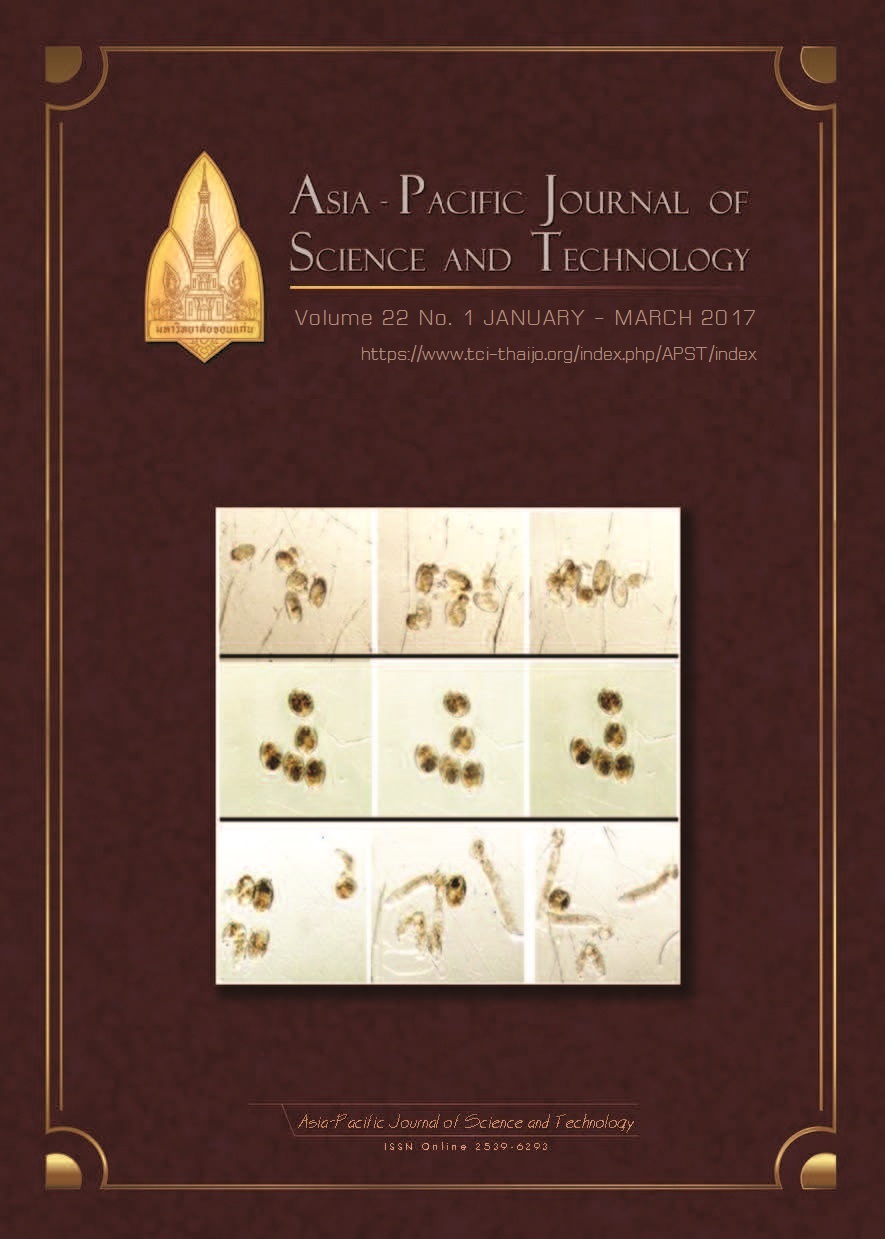Production of briquette fuel using wastewater sludge and banana peel waste
Main Article Content
Abstract
The objective of this study was to develop methodology for production of briquette fuel using wastewater sludge and banana peel waste. In this research, briquette fuel was produced from wastewater sludge mixed with banana peel waste in various weight ratios. Analyses of the briquette fuel properties were conducted including moisture content, ash content, volatile matter, fixed carbon, total sulfur and heating value. The assessment also determined the most appropriate wastewater sludge to banana peel waste ratio for briquette fuel and its economic value.
Selected ratios of wastewater sludge to banana peel for the test were 90:10, 80:20 and 70:30. The physical and fuel properties of the briquettes were tested. Briquette fuel at all tested raw material ratios significantly differed in terms of compressive strength, ash content and volatile matter (p<0.05). The briquette density at ratio of 70:30 was significantly higher than those at 90:10 and 80:20 (p<0.05). The fixed carbon at ratio of 90:10 was significantly lower than those at 80:20 and 70:30 (p<0.05). The heating value at ratio of 70:30 was significantly higher than that at 90:10 (p<0.05). No significant differences were observed in the moisture and total sulfur contents in the briquette fuels (p>0.05). Moreover, the briquette fuels at various tested ratios had a suitable moisture content with reference to the Standard of Community Products of the Thai Industrial Standard Institute. However, the heating values of the briquette fuels were still lower than the standard value. At a price of 1 baht/briquette (29 baht/kg) the breakeven point was 223,024 briquettes and the payback period was 4.58 years. From this finding, it was suggested that the appropriate ratio of wastewater sludge to banana peel waste for briquette fuel production should be 70:30 based on their optimal heating value, fixed carbon and volatile matter and lowest moisture content.
Article Details
References
[2] Bananas: Fruit Thailand to accelerate the development of the industry., [WWW Document]. URL http://www.cprnews/prnews.aspx?id=82319. (accessed 5. 6. 13).
[3] Wilaipon, P., 2006. The fuel handling characteristics of banana-peel briquettes produced by cold densification process [Thesis]. Khon Kaen: Khon Kaen University.
[4] Demirbas, A., 1999. Properties of charcoal derived from hazelnut shell and the production of briquettes using pyrolytic oil. Energy. 24, 141-50.
[5] Royal Forest Department. Charcoal production technologies for rural. 1998.
[6] Nakviroj, W., 1982. An evaluation of wood briquettes production project in Thailand [Thesis]. Bangkok:Kasetsart University.
[7] Benjamatarakul, A., 2003. Energy recovery from industrial wastewater sludge [Thesis]. Bangkok: King Mongkut’s University of Technology Thonburi.
[8] Pintuam, P., 1995. The study on utilizing residual sawdust from mushroom culture for briquette fuel [Thesis]. Bangkok: Mahidol University.
[9] Demirbas, A., Sahin, A., 1998. Evaluation of biomass residue: briquetting waste paper and wheat straw mixtures. Fuel processing technology 55, 175-83.
[10] Sudjaitham, N., 2003. Briquette fuel made from coffee residue [Thesis]. Bangkok: Mahidol University.
[11] Trancharoen, S., 2007. The use of sludge from a modified starch factory mixed with charcoal residue for briquette fuel [Thesis]. Bangkok: Mahidol University.
[12] Chaiyadejtayakul, S., 2001. Utilization of sludge cake from wastewater treatment plant and fine wood chip of pulp and paper mills for briquette fuel [Thesis]. Bangkok: Mahidol University.
[13] Dechphon, S., 2003. Study on potential and efficiency of the mixture of briquettes from sugar industrial sludge and bagasse [Thesis]. Bangkok: King Mongkut’s University of Technology Thonburi.
[14] Industrial Waste Management Bureau, Department of Industrial Works., 2012. Guidelines and criteria of waste for processing the briquette fuel and interlocking block.
[15] Thai Industrial Standard Institute., 2004. The standard of community product.
[16] Panumas, S., 1986. Briquette fuel production from weeds to replace firewood and charcoal in the rural [Thesis]. Bangkok: Kasetsart University.
[17] Cheremisinoff, P.N., Morresi, A.C., 1976. Energy from solid wastes. New York. Marcek Dekker.
[18] Wzorek, M., 2012. Characterisation of the properties of alternative fuels containing sewage sludge. Fuel Processing Technology 104, 80-9.
[19] Anurakpongsaton, N., 2003. The production of heating fuel briquettes from utilization of domestic wastewater sludge [Thesis]. Bangkok: King Mongkut’s University of Technology Thonburi.
[20] The price of charcoal., [WWW Document]. URL http : //www.clinictech.most.go.th/online/pages/techlist_display.asp?tid=384. (accessed 29. 9. 14).


